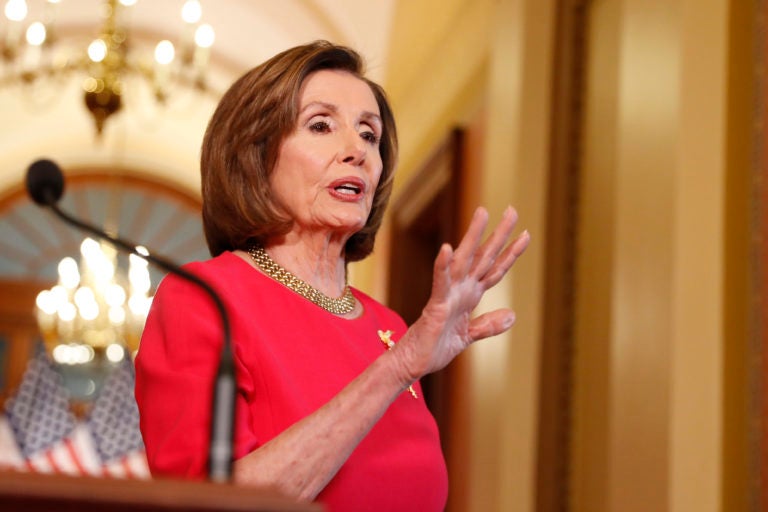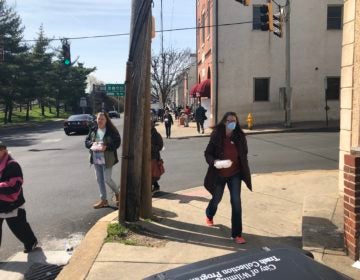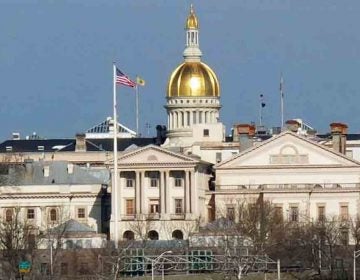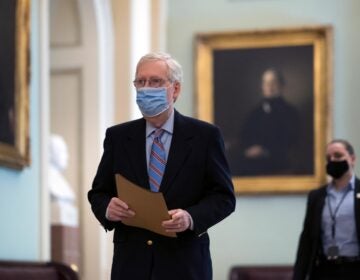Another attempt to move ahead on virus aid package snags
At the Capitol, tempers flared and emotions were raw as senators wrangled over critically needed aid.

House Speaker Nancy Pelosi of Calif. speaks outside her office on Capitol Hill, Monday, March 23, 2020. (AP Photo/Andrew Harnik, Pool)
President Donald Trump expressed qualms Monday about extending the current 15-day shutdown recommended by the federal government, even as his officials warned that the coronavirus crisis is deepening and Congress ran into more roadblocks trying to complete a nearly $2 trillion economic rescue package.
At the Capitol, tempers flared and emotions were raw as senators wrangled over critically needed aid. Democrats blocked another vote to advance the package, trying to steer more of the assistance to public health and workers. They argue the package is tilted toward corporations.
Trump sounded a note of impatience about the two weeks of suspended public activities his administration recommended Americans live through starting a week ago. In all capital letters, he tweeted: “We cannot let the cure be worse than the problem itself. At the end of the 15-day period, we will make a decision as to which way we want to go.”
His suggestion that the remedies may be more harmful than the outbreak contradicts the advice of medical experts across the country.
House Speaker Nancy Pelosi assailed Trump’s apparent wavering on the federal response and statements he’s made about the pandemic that some of his public-health officials have had to walk back.
“He’s a notion-monger, just tossing out things that have no relationship to a well coordinated, science-based, government-wide response to this,” she said on a health-care conference call. “Thank God for the governors who are taking the lead in their state. Thank God for some of the people in the administration who speak truth to power.”
A week ago, the White House came out with a “15 Days to Stop the Spread” plan that encouraged Americans to work from home and avoid bars, restaurants and discretionary travel, as well as groups of more than 10 people. It also told older Americans and those with serious underlying health conditions that they should stay home and away from other people.
Since then, states that have become hot spots for the virus have implemented even more radical measures, which the White House has applauded.
Yet on Sunday, Vice President Mike Pence said the country should expect new federal guidance “which will make it possible for people that have been exposed to return to work more quickly with — by wearing a mask for a certain period of time.”
On Monday, Treasury Secretary Steven Mnuchin was back on Capitol Hill after officials worked through the night on the massive economic rescue plan.
“We’re making a lot of progress,” Mnuchin said midday as he shuttled through the halls.
The top Senate Democrat, Chuck Schumer of New York, said: “We’re very close to reaching a deal.” Yet, another attempt to move the package forward snagged.
At the Capitol, the virus has struck close. Republican Sen. Rand Paul of Kentucky, who announced he tested positive for coronavirus, is now among five senators under self-quarantine. Several other lawmakers have cycled in and out of isolation. And the husband of Sen. Amy Klobuchar, D-Minn., is in a hospital with pneumonia after testing positive, she said Monday.
Democrats are holding out as they arguing the package is tilted toward corporations and did too little to help workers and health care providers. Schumer said earlier the bill would “affect this country and the lives of Americans, not just for the next few days, but in the next few months and years — so we have to make sure it is good.”
As talks progressed, Pelosi came out with the House Democrats’ own sweeping bill, urging Senate negotiators “to move closer to the values” in it. “We must be bold and forward looking,” she said.
Senate Majority Leader Mitch McConnell fumed, warning Democrats — and Pelosi in particular — to quit stalling on “political games” and strike a deal. Other Republicans joined with fiery arguments on the Senate floor.
“It’s time to get with the program, time to pass historic relief,” McConnell said as he opened the chamber. “The eyes of the nation are on the Senate.”
Trump has also balked at using his authority under the recently invoked Defense Protection Act to compel the private sector to manufacture needed medical supplies like masks and ventilators, even as he encourages them to spur production. “We are a country not based on nationalizing our business,” said Trump, who has repeatedly railed against socialism overseas and among Democrats.
On Monday, Democratic presidential rival Joe Biden criticized Trump for stopping short of using the full force of emergency federal authority .
“Trump keeps saying he’s a wartime president,” Biden said in an online address from his Delaware home. “Well, start acting like one.”
On the economic front, the Federal Reserve announced Monday it will lend to small and large businesses and local governments as well as extend its bond-buying programs as part of a series of sweeping steps to support the flow of credit through an economy ravaged by the viral outbreak.
With a population on edge and shell-shocked financial markets entering a new work week, Washington labored under the size and scope of a rescue package that’s more ambitious than any in recent times — larger than the 2008 bank bailout and 2009 recovery act combined.
Democrats are particularly fighting for constraints on the largely Republican-led effort to provide $500 billion for corporations. Democrats call that a “slush fund.”
Democrats won a concession — to provide four months of expanded unemployment benefits, rather than just three as proposed, according to an official granted anonymity to discuss the private talks. The jobless pay also would extend to self-employed and so-called gig workers.
But Republicans complained Democrats were holding out for more labor protections for workers, wanting assurances that corporations taking federal aid will commit to retaining their employees.
Alarms were being sounded from coast to coast about the wave of coronavirus cases about to crash onto the nation’s health system.
New York City Mayor Bill de Blasio said from the pandemic’s U.S. epicenter: “April and May are going to be a lot worse.” On NBC’s “Meet the Press,” he all but begged Washington to help procure ventilators and other medical supplies and accused the Republican president of “not lifting a finger” to help.
Trump urged Congress to get a deal done and, during the Sunday briefing, responded to criticism that his administration was sluggish to act. He cited his cooperation with the three states hardest hit — New York, Washington and California — and invoked a measure to give governors flexibility in calling up the national guard under their control, while the federal government covers the bill.
But even as Trump stressed federal-local partnerships, some governors, including Republican Greg Abbott of Texas, expressed unhappiness with Washington’s response. The president himself took a swipe at Democratic Gov. J. B. Pritzker of Illinois, saying that he and “a very small group of certain other Governors, together with Fake News” should not be “blaming the Federal Government for their own shortcomings.”
The urgency to act is mounting, as jobless claims skyrocket and financial markets are eager for signs that Washington can soften the blow of the health-care crisis and what experts say is a looming recession.
Central to the package is as much as $350 billion for small businesses to keep making payroll while workers are forced to stay home. There is also a one-time rebate check of about $1,200 per person, or $3,000 for a family of four, as well as the extended unemployment benefits.
Hospitals would get about $110 billion for the expected influx of sick patients, said Mnuchin.
For most people, the new coronavirus causes only mild or moderate symptoms, such as fever and cough. For some, especially older adults and people with existing health problems, it can cause more severe illness, including pneumonia. The vast majority of people recover from the new virus. According to the World Health Organization, people with mild illness recover in about two weeks, while those with more severe illness may take three to six weeks to recover.
—
Bev Banks contributed. Associated Press writers Jill Colvin, Colleen Long, Hope Yen, Mary Clare Jalonick, Ricardo Alonso-Zaldivar, Alan Fram and Padmananda Rama contributed to this report.
WHYY is your source for fact-based, in-depth journalism and information. As a nonprofit organization, we rely on financial support from readers like you. Please give today.




![CoronavirusPandemic_1024x512[1]](https://whyy.org/wp-content/uploads/2020/03/CoronavirusPandemic_1024x5121-300x150.jpg)


